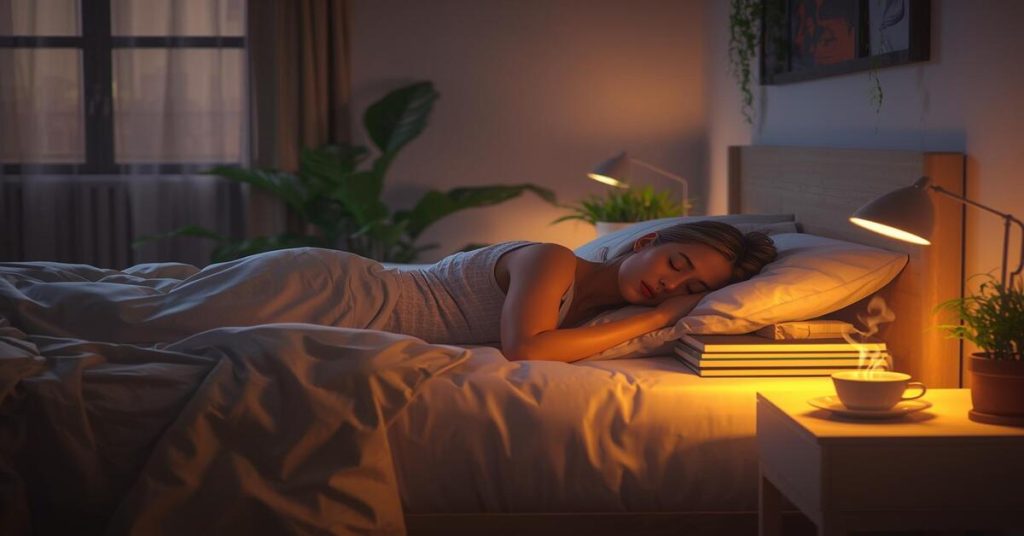Unlock Better Health: Proven Sleep & Mental Wellness Tips

Struggling with restless nights and anxious thoughts? You’re not alone. Good sleep is the secret weapon to better mood, sharper focus, and emotional stability. In this guide, we’ll explore science-backed sleep mental wellness tips to help you build lasting health from the inside out.
Why sleep & mental wellness matter
Sleep isn’t just rest—it’s the foundation of strong mental wellness. Quality rest supports mood balance, sharp thinking, emotional resilience, and overall energy. Here’s how to use effective sleep mental wellness tips to enhance your life.
1. Build a calming pre‑bedtime ritual
A consistent wind‐down routine signals your brain that bedtime is near.
- 🛁 Take a warm bath or shower 60 minutes before bed.
- 📵 Turn off screens—smartphones, tablets, and laptops—and switch to offline reading.
- 🧘♂️ Practice 5 minutes of breathing, meditation, or gentle stretching.
2. Create a sleep‑friendly environment
Small changes in your room can make big differences:
- 🌙 Lower the lights—use blackout curtains or eye masks.
- 🌀 Keep the room cool, around 18°C (65°F).
- 🛏️ Upgrade your bedding—pillow, mattress, and allergy‑free linens.
Read more: “Top 42 Natural Tips to Sleep Better at Night and Boost Mental Wellness 😴🧠”
3. Stick to a consistent sleep schedule
Going to bed and waking up at the same time—even on weekends—regulates your internal clock, improving both sleep quality and emotional stability.
4. Nutrition for restful sleep & mental calm
Your diet plays a key role in how well you rest and feel:
- 🥛 Evening snacks: try a small bowl of whole‑grain cereal with milk or a banana with almond butter.
- ☕ Avoid caffeine after 2 PM and heavy meals late at night.
- 💧 Stay hydrated—but reduce fluid intake in the last hour before bed.
5. Manage stress and mental load
Stress directly impacts sleep, and poor sleep feeds stress—a vicious cycle.
- 📝 Journal for 5 minutes before bed to offload worries.
- 🧠 Try progressive muscle relaxation—tensing then releasing body parts.
- 🎧 Listen to guided sleep‑wellness or nature sounds playlists.
6. Move your body, relax your mind
Regular physical activity helps sleep and mental health:
- 🚶♀️ Aim for 30–45 minutes of moderate exercise most days.
- 🧘♀️ Try yoga or tai chi, which combine movement and mindfulness.
- ⚠️ Avoid vigorous workouts within 2 hours of bedtime.
7. Optimize natural light exposure
Your sleep–wake cycle thrives on light cues:
- 🌅 Get morning sunlight soon after you wake up.
- 💻 Reduce blue‑light exposure at night—use night‑mode apps.
8. Let sleep be your ally in emotional balance
Quality sleep boosts:
- ✔️ Mood regulation—less irritability, more positivity.
- ✔️ Resilience—better handling of daily stress.
- ✔️ Cognitive clarity—memory, concentration, decision‑making.
Using targeted sleep mental wellness tips enhances all these areas.
9. Tackle common sleep‑wrecker habits
- 📺 Limit late‑night TV or news browsing.
- 🚫 No alcohol close to bedtime—it fragments sleep later.
- 🧠 If you can’t fall asleep in 20 minutes, get up and do something relaxing until you feel sleepy.
10. Track progress & iterate
Use a journal or app to log your sleep schedule, stress levels, and daily routines. Reviewing trends helps fine‑tune which sleep mental wellness tips work best for you.
Sample 7‑Day Sleep & Wellness Plan
Here’s a starter schedule to put it all together:
| Day | Evening Wind‑Down | Sleep Goal |
|---|---|---|
| Mon | Warm bath + journal | 7:30 PM–11 PM |
| Tue | Yoga + herbal tea | 7:30 PM–11 PM |
| Wed | Reading + breathing exercise | 8 PM–11:30 PM |
| Thu | Stretch + gentle playlist | 8 PM–11:30 PM |
| Fri | Walk + dim lights | 8 PM–11:30 PM |
| Sat | Bath + mindfulness app | 8 PM–11 PM |
| Sun | Breathing + prep for week | 8 PM–11 PM |
Read more: How Sleep Affects Mental Health: The Powerful Link You Must Know 🧠🌙
When to get professional help
Consider consulting a specialist if you experience:
- 😴 Chronic insomnia (over 3 months)
- 💤 Daytime fatigue affecting work or mood
- 🧠 Persistent anxiety, depression, or panic attacks
Resources like Sleep Foundation and certified therapists can help.
Deep Dive: How Sleep Connects to Every Part of Your Mental Wellness
To truly master your sleep hygiene and mental clarity, it’s vital to understand how deeply interconnected rest and emotional health are. These sleep mental wellness tips go beyond the basics—they provide a foundation for building long-term resilience, peace, and productivity.
🧠 The Brain–Sleep–Emotion Connection
During quality sleep, especially deep sleep and REM cycles, your brain consolidates memories, balances emotional responses, and resets stress hormones. Missing out on these cycles leads to mood instability, poor judgment, and reduced patience—all signs that your mental health is suffering.
That’s why practicing daily sleep mental wellness tips is not optional—it’s essential self-care.
🌿 Hormonal Harmony Starts at Night
When you prioritize sleep, your cortisol (stress hormone) levels naturally decline at night, while melatonin production increases. This hormone switch sets the stage for healing, calmness, and reduced anxiety. If you’ve been feeling edgy, foggy, or overwhelmed, chances are your hormonal rhythm is disrupted.
Implementing even just 2–3 consistent sleep mental wellness tips can gently retrain your body’s natural cycles.
🛌 Sleep as Therapy: Reset and Recharge
Many people rely on external methods for relief—coffee, screens, alcohol—yet forget that sleep is a built-in, 100% natural form of therapy. Every night gives your mind a chance to defrag and decompress, especially when supported by mindful habits like journaling or stretching before bed.
📉 Effects of Sleep Deprivation on Emotional Wellness
- 😔 Increases risk of depression and mood swings
- 🧠 Reduces brain plasticity, which affects how we learn and adapt
- 💥 Heightens reactivity to minor stressors
- 💤 Weakens emotional regulation skills over time
That’s why maintaining sleep mental wellness tips isn’t a luxury—it’s a necessity for emotional sustainability.
🌞 Morning Habits That Enhance Nighttime Sleep
Believe it or not, great sleep starts the moment you wake up. Creating a positive, grounded morning routine boosts serotonin and circadian alignment. Here are a few science-backed tips:
- ☀️ Open the curtains immediately after waking
- 🧍 Do 5 minutes of standing stretches or sun salutations
- 📓 Set a simple intention or gratitude note in your journal
These habits improve daytime mood and reinforce the nightly cycle, supporting your overall sleep mental wellness tips system.
📱 Technology and Its Silent Impact on Sleep
Phones and blue light don’t just keep you awake—they increase cortisol, suppress melatonin, and mentally stimulate your brain long after scrolling ends. Replace late-night scrolling with analog alternatives:
- 📚 Keep a physical book by your bedside
- 🖋️ Doodle, sketch, or write freely in a notepad
- 🎧 Use audio sleep meditations instead of video content
These swaps, while simple, are incredibly effective sleep mental wellness tips that reduce digital dependency and nurture peace.
🍽️ How Gut Health Impacts Sleep and Mood
Your gut produces 90% of serotonin—a key hormone in sleep and happiness. A poor diet can disrupt your microbiome, while a balanced one can boost neurotransmitter production. Try this checklist to align your food with your mental calm:
- 🥗 Add fermented foods: yogurt, kefir, kimchi, miso
- 🍌 Snack on bananas, oats, and almonds for magnesium and B6
- 🫖 Sip chamomile, passionflower, or valerian root tea after dinner
Read more: Unlocking Deep Restful Sleep: A Natural Path to Mental Wellness
📅 Weekly Reflection: What’s Working and What’s Not
At the end of each week, set aside 10–15 minutes to review your progress with sleep mental wellness tips. Reflect on questions like:
- 🌟 Which habit helped me feel more rested this week?
- ❌ What disrupted my sleep or increased stress?
- 💬 What emotion did I wake up with most mornings?
This reflection creates awareness, accountability, and a stronger bond with your own wellness journey.
🧘♀️ Blending Mindfulness Into Sleep Hygiene
Mindfulness doesn’t require hours of silence or a meditation cushion. It can be as simple as:
- 🛏️ Doing a body scan in bed before falling asleep
- 🫁 Focusing on each inhale and exhale while lying still
- 🕯️ Staring into a candle flame or essential oil diffuser for a minute
These techniques support sleep mental wellness tips by calming the racing mind and signaling the nervous system that it’s time to rest.
💤 How Consistency Beats Perfection
It’s tempting to try 10 new habits all at once, but true change comes from small, steady steps. You might skip a routine one day—and that’s okay. What matters is returning the next day. Sleep and mental wellness both respond better to gentle consistency than rigid perfectionism.
Mastering Lifestyle Alignment with Sleep Mental Wellness Tips
Achieving better sleep and stronger mental wellness is not just about isolated habits—it’s about creating a lifestyle that supports rest, clarity, and emotional balance across every part of your day. Let’s explore how aligning your day-to-day choices with your natural rhythms can unlock lasting results.
⏰ Micro Habits That Have Macro Impact
Big transformations start with tiny actions. By introducing micro habits into your routine, you gently reprogram your body and brain to function more harmoniously. Some of the most effective micro-level sleep mental wellness tips include:
- 🧂Adding magnesium-rich foods like spinach, avocado, and pumpkin seeds to dinner
- 📴 Setting a “tech curfew” at least 1 hour before bedtime
- 📆 Using calendar reminders to wind down by the same time daily
These minor shifts—when practiced consistently—lead to massive gains in both mental clarity and nighttime rest.
🌅 Aligning with Nature’s Clock: The Circadian Blueprint
Our bodies are evolutionarily wired to respond to sunlight and darkness. When we live in alignment with that rhythm, our hormones, sleep cycles, and emotional resilience improve. You can support your circadian rhythm using these focused sleep mental wellness tips:
- 🚶♂️ Spend 15–30 minutes outdoors every morning, preferably in natural sunlight
- 🕯️ Dim lights indoors after sunset to mimic twilight
- 🌕 Avoid artificial light exposure (especially blue light) during nighttime wind-down
By syncing your routine with daylight cycles, your body begins to anticipate sleep, resulting in easier bedtimes and deeper rest.
🧠 Mental Detox: The Power of Thought Management
Your mental wellness isn’t only affected by your environment or routine—but also by the quality of your thoughts. Practicing thought awareness helps stop overthinking and supports smoother sleep transitions. Try the following tools:
- 📓 Gratitude journaling – Write down 3 things that went well every night
- 🔁 Mental download – Spend 2 minutes writing down all lingering thoughts before sleep
- 🧘 Box breathing – Inhale for 4 seconds, hold for 4, exhale for 4, hold for 4 (repeat 5x)
These strategies act like mental “showers,” washing away emotional clutter and enabling your brain to rest.
💼 How Your Work-Life Affects Sleep & Mental Wellness
Too many people carry their workday stress into the night, leading to restlessness and burnout. Your evening is sacred—it’s the recovery zone. Try these sleep mental wellness tips for better post-work decompression:
- 🎧 Create a “transition playlist” that you play after shutting down work
- 🧦 Change into comfy clothes or take a short walk after logging off
- 📴 Leave work emails unchecked until the next morning
These boundaries help the brain understand that the stressful part of the day is done, and that relaxation can begin.
Read more: 🌙 Transform Your Life: How Sleep Quality Impacts Emotional Well-Being
👨👩👧 Family Dynamics & Household Sleep Hygiene
Sometimes your personal sleep efforts get interrupted by others in the household—family members watching TV late, pets disturbing your rest, or young children waking up in the night. Here’s how to create a sleep-positive environment for all:
- 📢 Have a “quiet hours” agreement in the home (e.g., no loud activity after 9 PM)
- 🐾 Give pets their own cozy sleeping area if they interrupt your sleep
- 🧒 For kids, establish a predictable bedtime with storytime or calming music
By normalizing bedtime structure for the whole household, you reduce disruptions and build consistency into your sleep mental wellness tips.
🌬️ Breathwork & Nervous System Reset
The breath is one of the fastest ways to calm the nervous system. If you’re feeling mentally overwhelmed or tense before bed, use breathwork to shift your body into a rest-and-digest state. A simple exercise:
Sit or lie down comfortably. Inhale slowly for 5 seconds. Hold for 2 seconds. Exhale gently for 7 seconds. Repeat this pattern for 5 minutes.
This pattern lowers heart rate, releases muscle tension, and clears the mind—perfect for sleep preparation.
📲 Smart Use of Sleep Tech
Not all technology is bad for sleep—some tools actually support your efforts. Here are some helpful apps/devices aligned with sleep mental wellness tips:
- 🛌 Sleep tracking apps like Sleep Cycle or Pillow for pattern analysis
- 🧘 Calm or Insight Timer for guided sleep meditations
- 🕯️ Smart bulbs with adjustable lighting for sunrise simulation
Used intentionally, these tech tools help reinforce positive behaviors and allow deeper insight into your rest cycles.
📖 Case Study: Sleep Success in Action
Let’s look at a real-life example. Sarah, a 34-year-old teacher, suffered from chronic anxiety and only got 4 hours of broken sleep. After applying 4 sleep mental wellness tips—journaling, screen curfew, nightly stretching, and consistent bedtime—she reported:
- 🌛 Falling asleep 45 minutes faster
- 😌 Reduced morning anxiety by 70%
- 💪 Higher emotional tolerance at work and in family life
Her secret wasn’t complicated—it was consistency and mindfulness.
🧩 The Holistic Sleep–Life Puzzle
By now, it’s clear that sleep and mental wellness aren’t isolated goals. They’re deeply tied into your food, thoughts, activity, relationships, and routines. Think of your life as a puzzle—and these sleep mental wellness tips as the key pieces that hold the whole picture together.
Whether you’re a busy professional, a student, a parent, or a retiree—your sleep needs respect and reinforcement. Mental wellness starts the moment you decide to take rest seriously. 💤
🔄 Building Your 30-Day Sleep Reset Plan
To truly transform your sleep and emotional wellness, commit to a 30-day reset challenge. Here’s a suggested structure:
- 📆 Week 1: Sleep schedule + bedtime routine
- 🍽️ Week 2: Nutrition adjustments + caffeine timing
- 🧠 Week 3: Mindfulness and journaling
- 🏃 Week 4: Movement and light exposure
Track your progress in a notebook or app, and reflect weekly. Most people report major improvements by Day 10—and by Day 30, these sleep mental wellness tips become habits, not chores.


